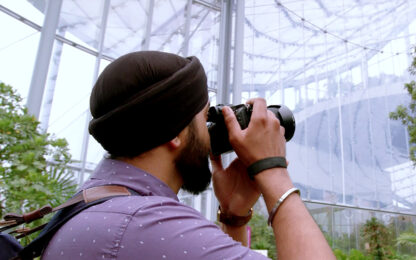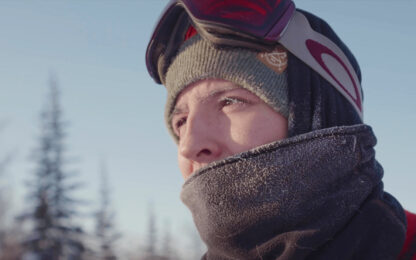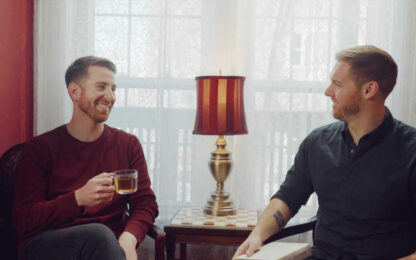Explore Where Indigenous Tourism Can Take You
Three Leaders of Indigenous Tourism Share Their Stories, Culture, and Vibrant Histories
Indigenous tourism is thriving in Canada. As we continue down the path of truth and reconciliation, this sector is providing the opportunity for Indigenous Peoples to share their cultures, experiences, and perspectives while enjoying fulfilling, life-long careers.
Canada’s Indigenous tourism industry is growing rapidly, drawing visitors from all over the world who are eager to learn more through authentic, meaningful experiences. Leanne, Paul, and Les are three community leaders who are doing incredible work to share their stories and preserve traditions through careers in tourism.
Connecting with Nature, Community, and Family Roots
Leanne Edenshaw was born and raised in the bustling city of Vancouver, but after her son was born, she decided to move to Haida Gwaii—her mother’s homeland. This breathtaking archipelago, the traditional territory of the Haida Nation, is home to stunning scenery, unique wildlife, and lush rainforests along the coast of British Columbia.
“[My son] is surrounded by nature. He can appreciate the land and everything that it gives us; he can go hunting and fishing with his grandparents. These are things that he just can’t do in the city,” says Leanne.
After spending many years working as a server, Leanne’s most recent job was in an office—but she did not feel fulfilled. She missed interacting with the public every day, so when she saw an opening for a part-time position at Haida House, she jumped at the opportunity. Today, she works there full time as the floor manager.
Haida House offers much more than a standard hotel. This stunning, peaceful eco-lodge features beachfront cabins and scenic walking trails, with immersive cultural teachings and experiences. Guests can meet with Indigenous carvers offering demonstrations of their craft, and cultural ambassadors are available to take visitors on guided tours, identifying local wildlife like birds, plants, and mushrooms.
“I don’t know how to describe it. I call it magical. It’s still and calm. And it’s not so fast like it is in the city. I just feel at home here, and not in such a rush to get everything done,” Leanne says.
Leanne has enjoyed going through training to develop her management skills, and she loves how every day is different. But her favourite part of the job is connecting with people: the guests who visit from all around the world, her friendly teammates, and the tight-knit community that feels like a family.
“I love working here. It didn’t occur to me, like, how proud I would be working here. People who come and visit from the surrounding communities absolutely love it. I think that a big reason people come back is because they feel like family here.”
Honouring Family Recipes and Elevating Classic Cuisine
Paul Natrall has fond childhood memories of spending time in the kitchen with his grandmother, preparing dishes using meat his uncle had hunted. Growing up in the small village of Ustlawn in Squamish Nation, Paul had tried a few different jobs, like babysitting, manual labour, and the car wash—but prospects for a fulfilling, lifelong career were slim.
“My dad passed away when I was young, right? So like, male role models were rare. I was like, ‘It’s not bad in the kitchen.’ I got to enjoy time with my grandmothers and just create stuff that tastes really good. And, you know, it just sparked from there,” says Paul.
He enrolled in culinary school to learn more advanced cooking techniques, but he knew he wanted to focus on Indigenous cuisine. Paul experimented with ancient methods like cooking in the ground using hot stones, and loved finding innovative ways to prepare traditional foods.
Now, he’s bringing elevated Indigenous cuisine to the masses and gaining worldwide attention as the owner and operator of Vancouver’s first Indigenous food truck, Mr. Bannock. After being invited to compete at the World Culinary Olympics in Germany in 2012, Paul started receiving offers for television appearances on popular shows like Rachel Ray and Cheese: A Love Story on the Food Network.
“Just another kid from the rez, being able to go and do these things is huge, you know. But like, all that being said—for me, it just comes down to the food. This is what I learned, and this is what I can create. And hopefully you all can enjoy it,” says Paul.
Paul knew a culinary career could offer him a bright future, but he didn’t realize how empowering it would be and how it would help him find his voice.
“With culinary, I’m able to say, ‘Hey, this is my food. This is my culture. This is what my ancestors did. And this is how they did it. And this is how I’m going to do it because we’re in 2023.’”
Today, Paul encourages his own kids to help him in the kitchen, just like he helped his grandmother years before.
“I tell my kids, ‘You guys can take part, you can watch and learn, but you don’t have to be a chef or cook. It’s giving you life skills that you can use, whether you’re in the kitchen, or you want to become a lawyer or a doctor—people have to eat, so that can get you through college or university. And you can learn to feed yourself on top of that, too,'” says Paul.
Following the Paths of Ancestors
Les George is an Indigenous storyteller, knowledge keeper, and member of Tsleil-Waututh Nation. For 25 years, he has worked as a guide for Takaya Tours, taking visitors on eco-tours in Vancouver’s Lower Mainland. During canoe and sea kayak expeditions, he shares legends, language, traditions, songs, and history lessons with participants. He loves that his job brings people from around the world to him.
Sharing knowledge while paddling the waters of his homeland holds special significance to Les. His ancestors have paddled down those same paths, and his work with Takaya Tours strengthens his connection to the spirit world.
“Tsleil-Waututh means ‘people of the inlet.’ I come from these waters. This is where my heart is. I tell people it feels like medicine when I’m out on the water,” says Les.
He finds great satisfaction in hearing guests repeat language he has taught them, watching them revel in the beauty of nature and excitedly learn how to paddle—but the impact of his work goes far beyond entertainment. Les is the first generation in his family not to attend residential school. Before him, seven generations of ancestors went through the residential school system.
“It’s a little bit of truth and reconciliation. And any truth that comes out within our First Nations is a big step for us.”
Les’s favourite part of the job is leading canoe tours called Tribal Journeys. Before going ashore, Les plays his drum and guides visitors through a welcome song in his traditional dialect. Those on the shore welcome paddlers with their own song, as this was a means of communication between tribes.
The powerful rhythm of the drum effects each of his guests differently. Some are excited, some are brought to tears, and sometimes kids think it’s funny—but Les always enjoys teaching them about the spiritual significance behind his traditions. As a knowledge keeper, Les says the most important thing is to speak what’s in your mind and heart.
“I think if you find the right job that incorporates and involves your culture, and helps share it amongst others—throughout the province, throughout the nation, and to many other nations— then it doesn’t even feel like work. Feels like medicine.
If you want to share your knowledge, Indigenous tourism can take you there.“
Related Stories

Journey into an Exciting New Career in Canada
Moving to a new country can be nerve-racking—especially when searching for a job. But for these three newcomers to the prairie city of Winnipeg, Manitoba, a career in tourism offered an exciting future full of enriching experiences and meaningful connections.
Learn more
Wapusk Adventures
One man’s passion for sharing his culture led him to return home—and stay
Learn more